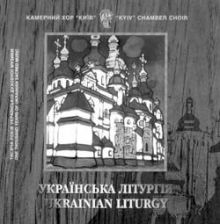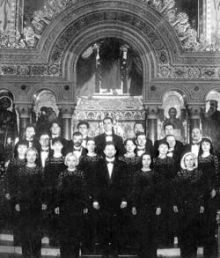The destiny of any performing company is like that of any individual; it can be happy and bright or unproductive and dramatic, for all of us are born under our particular stars.
The Kyiv Chamber Choir was obviously born under a happy star, promising this performing group sure and steady creative growth. The paradox is that the destiny bestowed on the choir would suffice for several performing groups. The Kyiv Chamber Choir is not only the holder of several world records, which I will discuss later; its conductor, Mykola Hobdych, and his singers have proved that classical art can be an ubersuccess, even in the daily utilitarian sense.
As for the records that no one was particularly keen on winning, they just happened; as though of their own volition. In the mid- 1990s the Kyiv Chamber Choir was entered in the Guinness Book of Records, owing to an absolutely unprecedented event. During an international choral competition held in Ireland, one of the world’s best, our choir scored 99 points and was named the winner. And what is the connection with the Guinness Book of Records? The maximum score for the competitors was not supposed to surpass 90 points. In 1997 the Kyiv Chamber Choir staged a solo concert at Carnegie Hall in New York, which all performers dream of doing. They were the first Ukrainian performers to step onto that prestigious stage.
The choir’s packed concert schedule is borne out by the number and caliber of their choral concerts — and this number is also reaching record levels: nearly 900 concerts with tours in 20 countries. The Kyiv Chamber Choir has issued a staggering 20 CDs, recorded during the 15 years of the choir’s existence. No other choir in Ukraine or abroad has beaten this record. Incidentally, the choir will be celebrating its 15th anniversary in its most natural environment, the National Philharmonic Society of Ukraine.
The Kyiv Chamber Choir was formed in 1990 by Mykola Hobdych, a young and ambitious graduate of the Kyiv Conservatory. He began his career by trying out some innovative approaches, which is unusual for traditional academic performing groups. Like Hobdych, the singers are all graduates of conservatories and music colleges, and together they were determined to change the public’s established view of choirs. They succeeded. Every time the choir appeared on stage the audience was packed, as every performance offered new and unexpected discoveries. Then the Kyiv Chamber Choir was noticed abroad. The first five years of its existence were filled with stunning achievements. The choir won the Golden Diploma at the First Robert Schumann Competition in Zwickau (Germany, 1992); First Prize at the 12th International Church Music Festival in HajnЧwka (Poland, 1993); Grand Prix at the 6th International Choral Festival in Sligo (Ireland, 1993); Second Prize at Llangollen International Musical Eisteddfod (Wales, 1994); and the Grand Prix at the 20th International Church Music Festival in HajnЧwka (Poland, 1996 and 2001). Competing in different types of music festivals, the choir has shown a fantastic degree of flexibility, demonstrating a keen awareness of the stylistics and particularities of compositions, and transforming even run of the mill material into a virtuoso musical artifact. At times one felt as though the 20 singers were a single creative soul capable of working wonders and miracles, like an angel. The combination of sincerity, perfection, and style forms the cornerstone of the Kyiv Chamber Choir’s success.
“I try to make every concert as spectacular as I can,” says Mykola Hobdych. “I dream of a synthesis of sound and light. I want the visual aspect, particularly the stage design, to be captivating and pleasing to the eye, because the point is to create an artistic celebration. It is too archaic simply to sing parts of the concert without leaving the choir stalls. I am convinced that choral art should develop by relying on new technology of the 21st century.”
Indeed, during concerts of the Kyiv Chamber Choir you can’t see the traditional choir stalls. The singers form a “horseshoe,” they divide into quartets, they sing from backstage, they go to the stage through the concert hall. Despite this movement, the effect of a marvelous, almost ideal, choral ensemble is preserved. Hobdych, the choirmaster, is always on the go. Sometimes he sings solos; sometimes he “leaves” his singers to go backstage from where he conducts the choir. In a word, he represents a new generation of conductors, and he has succeeded in breathing new life into this most conservative of genres. The choral concerts of the Kyiv Chamber Choir are as classical as Hobdych’s repertorial policy is flexible.
The choir’s repertoire is indeed a golden repository of national and world classics. Here one finds medieval, renaissance, classical, and contemporary music, including avant-garde and free jazz pieces. Chronologically, all this diversity embraces six centuries. This particular circumstance appears to be laying the groundwork for another record. However, the undisputed “gem” of the Kyiv Chamber Choir is Ukrainian baroque music. Hobdych’s student days and his first professional steps coincided with the revival of the musical legacy that had been “forgotten” in Soviet times: the works of Maksym Berezovsky, Artem Vedel, Mykola Diletsky, and other masters of the age of Ukrainian baroque. In time, he expended considerable efforts to bring the works of baroque masterpieces back from oblivion and restore them to the cultural stratum. This was by and large the aim of the festival of choral art known as “Golden-Domed Kyiv,” which is held every year in the Ukrainian capital to showcase examples of choral composition by contemporary composers. The Kyiv Chamber Choir’s “Christmas soirees” in the Lysenko Hall of Columns at the National Philharmonic Society are like an annual progress report. This is a fairytale performance and at the same time a testing ground, as Hobdych and the choir tend to freely interpret folk Christmas rites and customs, and they always manage to come up with innovative approaches.
However, what is truly deserving of respect is the choir’s devotion to their numerous recordings whose aim is to create a phonographic fund of Ukrainian and world classics. Here too the Kyiv Chamber Choir is unmatched, and all the more remarkable, considering that there are no recording companies in Ukraine that specialize in classical music. Among the choir’s albums is a series of seven outstanding CDs that are united by the epigraph “1,000 Years of Ukrainian Spiritual Music.” One of these albums, Ukrainian Liturgy, is a distillation of all the other albums, but at the same time revealing the essence and particular features of the Divine Liturgy. The national visage of the Liturgy was formed over several centuries. While strictly preserving the canon of the Byzantine Liturgy, Ukraine developed its own linguistic-musical system, constantly perfecting its voice in the universal choir of praises to the Lord. In an attempt to create a living and solid atmosphere of sobornist [spiritual and political unity rooted in a free and independent Ukraine — Trans.] the singers performed works written by different composers as well as compositions of different styles and from different periods. This is precisely the manner in which the album Ukrainian Liturgy is constructed. The marvelous space between the oldest and the most modern compositions spans five centuries. Despite the stylistic diversity, this CD is a single and remarkably harmonious masterpiece. The album includes music by Mykola Leontovych, Kyrylo Stetsenko, Mykola Dyletsky, Maksym Berezovsky, Mykhailo Verbytsky, Dmytro Bortniansky, Artem Vedel, and Andriy Hnatyshyn. The choir has devoted individual albums to many of these composers.
Another album, Ukrainsky Velykden (Ukrainian Easter) reveals the features of the Orthodox Easter celebration, the “holiday of holidays” and the solemn crown of our faith. Our Liturgy is a musical one. The disk features 15 compositions demonstrating the entire coloring of Ukrainian Easter. Naturally, the coherence of the works corresponds to the ritual event, while the combination of ancient canonical songs, baroque forms, and works of contemporary composers creates a “chain” symbolizing the continuity of tradition filled with passion and beauty.
Among modern composers, Hobdych devotes the greatest attention to two composers, Lesia Dychko (the album Solemn Liturgy) and Yevhen Stankovych (the albums Liturgy of St. John Chrysostom and Choral Works). The first Choral Works CD starts with the “Psalms,” profoundly religious works that are absolutely unusual for the composer. Hobdych initiated the writing of this work. During each “Golden-Domed Kyiv” festival a separate concert has been devoted to a famous Ukrainian composer. The concert in 2000 highlighted choral pieces by Stankovych. “After hearing a number of canonical works,” recalls the composer, “I arrived at the conclusion that many of them are anachronistic, with the exception of those written by the great composers. For me, the standard is Bach whose works I heard performed at concerts and in cathedrals. All his works are impressive because of their colossal energy and creative freedom, something that few composers have succeeded in mastering.”
Stankovych’s “Psalms” are performed in turn by the women’s, men’s, and mixed choirs. The second Choral Works disk starts with the folk opera Kupalo. Its premiere was slated for 1979 at the Ukraine Palace in Kyiv. But after the dress rehearsal with the State Symphony Orchestra conducted by Fedir Hlushchenko and the Veriovka Folk Choir, there was a phone call from “upstairs” and the opera was banned because of accusations of “bourgeois nationalism.” Years later Hobdych did his own interpretation of the opera for a mixed choir, and the composer liked it. “ Kupalo is not my work; it has belonged to the Ukrainian people for several thousand years. Hobdych created his own version and converted many parts to the choir. Now there is a mass of performers and even the idea of this composition is different,” says Stankovych. “But this version also has a right to exist.”
Without a doubt, Hobdych has his own interpretations of Ukrainian baroque and classical composers. Nevertheless, we have absolutely flawless examples of what may be described as the golden mean between all possible interpretations of the classics. The creative endeavors of Mykola Hobdych and the Kyiv Chamber Choir have restored priceless treasures to us — the works of Berezovsky, Vedel, Verbytsky, Bortniansky, and other celebrated Ukrainian composers.








